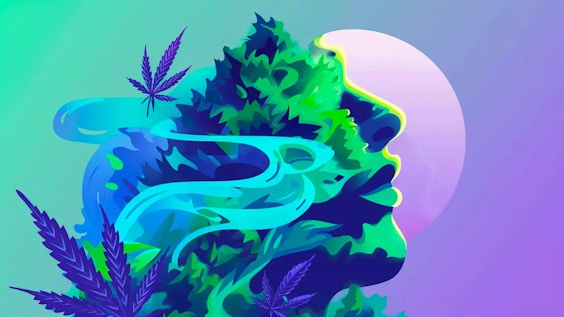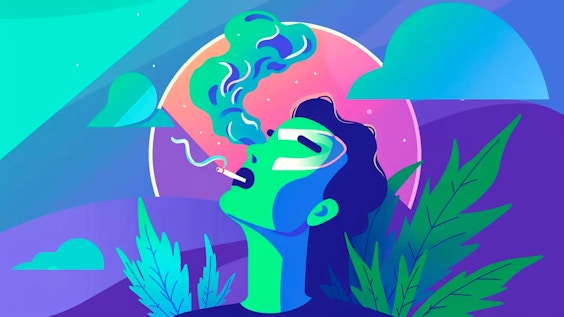
Side Effects of Marijuana
Last Updated: Fri, March 29, 2024Marijuana has numerous short-term and long-term side effects. These include euphoria, paranoia and other delusions, anxiety & restlessness.
The primary ingredient in marijuana is tetrahydrocannabinol (THC). THC functions similar to anandamide – another chemical in the brain. Anandamide influences numerous functions in the brain, including coordination, thinking, memory, and motivation. THC mimics anandamide by binding to CB1 and CB2 receptors in the brain and in the periphery. Most of these effects are short-term, however extended moderate to heavy use of cannabis can create long-term adverse effects and addiction..
One effect of THC is to alter the brain’s drive-reward system by indirectly increasing dopamine in a part of the brain called the mesolimbic system. This may contribute to marijuana’s risk of causing addiction.
Short Term Effects of Marijuana
The short-term effects of marijuana can include:
-
Euphoria or a sense of pleasure
-
Relaxation
-
Heightened sensory perception (of sounds / colors)
-
Altered sense of time
-
Increased appetite
-
Dry mouth
-
Psychosis, (when taken in high doses)
-
Paranoia
-
Delusions (when taken in high doses)
-
Heightened heart rate
-
Anxiety
-
Impaired body movement
-
Impaired memory
-
Difficulties with thinking and problem-solving
-
Hallucinations (when taken in high doses)
One recent study showed that even occasional short-term use of marijuana impairs learning and school performance.
The amount of time it takes for the effects to take place depends on how marijuana is consumed. For example, an edible can take 30 minutes to an hour before the effects start to occur, since the drug needs to pass through the digestive system. Smoking marijuana, on the other hand, passes through the lungs to the brain almost immediately.
Note that not everyone reports the positive short-term effects of marijuana. Although many people, experience euphoria and general relaxation, some experience anxiety and paranoia.
Long Term Effects of Marijuana
Regular heavy to moderate use of marijuana has several negative long-term effects. These negative long-term effects are most pronounced in the developing brains of children, adolescents, and young adults.
Children born to parents who used marijuana in pregnancy have changes to the hippocampus that may result in learning disabilities, behavioral problems, impaired attention, impaired problem-solving abilities, and memory problems. Babies of cannabis users also may have lower birth weights.
Some long-term effects of marijuana include:
-
Cognitive impairment
-
Memory problems
-
Impaired impulse control
-
Impaired planning and problem solving
-
Learning disabilities
-
Increased anxiety
-
Increase risk of psychosis, including hallucinations and paranoia
-
Depression and suicidality
-
Risk of respiratory problems
-
Risk of infections
-
Cannabinoid Hyperemesis Syndrome (intense nausea and vomiting)
-
Risk of testicular cancer
-
Other cancers
-
Elevated heart rate
-
Apathy
-
Reduced quality of life
Brain Development
Marijuana damages brain development. Adolescents who use marijuana have impaired thinking, memory, and learning. This seems be because marijuana impairs the brains ability to make the connections needed for these functions.
The harmful effects of marijuana may be permanent, especially for people who start using marijuana as children or teens. One study from New Zealand showed that heavy marijuana users lost and average of 8 IQ points between the ages of 13 and 38. Those who quit marijuana as adults still had a permanent loss of mental functioning. It appears marijuana may cause a significant decline in general knowledge and verbal ability.
Schizophrenia
Marijuana markedly increases the risk of psychosis in people with a genetic vulnerability to schizophrenia. In susceptible individuals, marijuana and provoke hallucinations, paranoia, and disorganized thinking.
Lung Disease
When marijuana is inhaled, it causes inflammation of the lungs. This can result in a cough or irritated throat. While marijuana smokers do report more outpatient care for respiratory problems, it is unclear if smoking marijuana puts someone at increased risk of lung cancer. That said, many who smoke marijuana are diagnosed with chronic bronchitis.
Cannabinoid Hyperemesis Syndrome
In very rare cases, some people suffer from cannabinoid hyperemesis syndrome. This condition causes extreme nausea, vomiting, and dehydration.
Testicular Cancer
There has been a clear link made between males under the age of 50 and a particularly aggressive form of testicular cancer. The study confirmed that males who use marijuana frequently are at a much higher risk of developing a nonseminomatous testicular germ cell tumor.
Cognitive Effects
Beyond marijuana use in pregnancy and adolescence however, the long-term effects are debated. Many studies conducted on marijuana use in adulthood have reached different conclusions. Coronary Artery Risk Development in Young Adults conducted a study over the course of 25 years involving 4,000 adults and their marijuana use. The results of the study found that the amount of marijuana consumed was related to lower verbal memory scores, but it was harder to gauge processing speed or cognitive function due to the myriad of other drugs used. In short, lifestyle and additional substances continue to be another factor.
Reviews of studies of marijuana and cognition indicate that long-term use of marijuana results in impaired memory, impulse control, and problem solving. These difficulties may contribute to the lower quality of life that chronic marijuana users experience.
Is Marijuana Addictive?
Marijuana can be addictive. A study in 2015 estimates that 30% of users have some form of Cannabis Use Disorder, ranging from mild or moderate to severe. Anyone who starts using the drug before the age of 18 is seven times more likely to develop a Marijuana Use Disorder. Marijuana rewires the brain’s rewards system and reduces its own sensitivity to endocannabinoid neurotransmitters. Additionally, people can build a dependence on the substance without being addicted. Typically, dependence implies that a person feels withdrawal symptoms if they go without the drug for an abnormal length of time. The most common side effects of which are restlessness, lack of appetite, and increased irritability.
Since the mid-1990s, the potency of marijuana has increased substantially, with the average THC content rising from 3.7% to 6.1 in under ten years. Research is still ongoing to determine the full, long-term effects of marijuana.
Resources
I Am Sober is a free app that helps you get some control back in your life.





